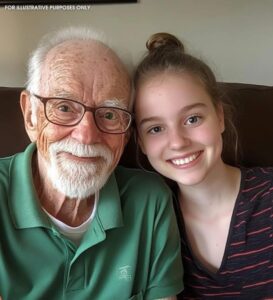That flight wasn’t planned to include me. My previous one was canceled last minute, thus I was stranded in row 22’s middle seat on this full plane. Before we exited the gate, the 9- or 10-year-old next to me was struggling. Every overhead announcement made him quiver and yank at his seatbelt. His mom tried hard, but she was breaking down. When asking the flight attendant for juice, she whispered that the boy had autism.
We saw most folks make that awkward shuffle to avoid staring. I have to admit, I was nervous. Not because of him, but because I saw his mom was overwhelmed.
After turbulence halfway through the journey, the youngster cried loudly. Some sighed, others glanced. The flight attendant, a small woman with a tight bun and serene gaze, knelt beside him. She first said little. Sitting at eye level with a little pack of pretzels.
She muttered something to him after a few minutes, but I couldn’t hear it. Whatever it was, he stopped crying. Just like that. Not everything at once, but enough to change energy. He wiped his face and nodded at her.
She crouched until the seatbelt sign came on again, then patted his mom’s shoulder.
I wanted to ask her what she said and what magic phrase worked, but she disappeared behind the cabin’s front curtain.
The wild part? Upon landing, the mother relayed the flight attendant’s words.
As we removed our carry-ons from the overhead bins, I waited to catch this flight attendant by the exit. Mom glanced to me, eyes ringed with relief, as if reading my mind.
“She told him,” the mother murmured softly, “that sometimes clouds bump against the plane to remind us we’re up in the sky and safe. We fly, not fall, with every jolt.”
It sounded simple, but the boy grabbed it then. Clouds bumping the plane signaled safety. The slight change in perspective calmed him.
Though intrigued, I nodded, but the parent added, “And she said she knew a trick to make the clouds give us room.” The mother smiled slightly. She advised him to envision the plane hugging the clouds instead of being scared by them.
Even in the narrow aisle, I got goosebumps. Turning fearful turbulence into comfort was such a simple, heartfelt idea. I wanted to thank the flight attendant immediately.
But you know how deplaning goes—everyone is shuffling out, the pressure is on to go swiftly, and the flight attendants are gently nodding as people pass. I briefly caught the attendant’s sight. Since her smile grew slightly, she must have recognized me and known we had experienced a silent moment of change. Then passengers’ slow crawl caught me.
I had no idea that this nice flight attendant, whose name tag said “Ria,” would change my life.
Two weeks later, I had a work flight. I had a cross-country meeting, and my seat was again row 22. I saw the irony. I boarded and saw the usual travel chaos: worried parents, businesspeople racing to stow computers, college kids on break.
I settled in, searching my purse for headphones, when a familiar voice spoke behind me. “Coffee or water, sir?” I looked up and saw Ria, the flight attendant, smiling pleasantly at a man in row 20. She recognized me and raised an eyebrow. She parted her lips, perhaps happy to see a familiar face.
The oddest comfort. I don’t like small conversation, but I wanted to understand more about her modest giving. Compassion was evident in her stance.
Flight finished uneventfully. I stopped to greet at the exit. Remembering me, she nodded.
“You were on that flight with the mother and her son,” she added lightly. How’s everyone?
I said we arrived safely, but her comments lingered with me. I admitted, “Sometimes turbulence freaks me out. The plane hugging the clouds has crossed my mind.”
Ria chuckled. It works, right? She astonished me. I’m on a short stopover. I’ll buy you coffee if you have time. Please hear a story.”
I didn’t hesitate since her voice was so real. “Sure.”
A modest coffee stand was near the terminal. She told me she was afraid of flying while we waited in line. When she was young, her father urged her to consider the plane and clouds friends, not foes. She was calmed enough to pursue her dream profession in the sky.
“And that’s what I whispered to the boy,” she replied, swirling a hot cup. Not just to soothe him but to show him—and his mom—a fresh perspective on fear.”
After talking, I saw a deeper narrative in her eyes. I refused to inquire. After saying farewell, she took her next flight and I rushed to catch mine. I assumed that was it.
I experienced life’s volatility in the following months. I was laid off unexpectedly when the company restructured. I was applying for any job because my rent was rising. My nights were filled with worry. I would think of Ria’s calm advice during it. Maybe these bumps are a reminder that I’m alive and that every jolt doesn’t mean I’m falling—maybe I’m still soaring. That modest reframe gave me optimism when everything else seemed unstable.
After time, I got a new job. Though not as flashy as my former one, it was a start. Some months later, work took me to a brief conference in Austin. Fate had me see Ria again at the terminal, slumped in a row of chairs near Gate 14. Her frayed clothing and red eyes suggested she had been sobbing.
I didn’t want to intrude, but my intuition told me to. “Ria? Are you okay?
She looked up and smiled thinly. “You again,” she said. “I’m fine. I’m just waiting for a flight home. A family emergency.”
Heart clenched. Anything I can do?
Shaking her head. “No, I just… My dad’s unwell. Doctors insist I should be there.”
I nodded. Despite not knowing her well, I felt indebted to her. She had quietly showed the boy and myself kindness. Part of me wanted to repay her compassion. I said, “Let me at least buy you a snack or drink while we wait.”
She laughed tearfully. “Sure.”
We found a nook of the airport café. Her dad, who taught her to love planes and clouds, was dying, she said. Hear her voice shake at the thought of losing him was terrible. He was her constant, gentle guide, she told me. She said she was afraid of his mortality and life without him.
She looked into her cup. “It’s funny,” she said. “I tell people clouds are friends, but all I feel is stormy weather.”
I remembered the modest, transforming lesson she taught the autistic boy—and consequently me—as we spoke. I whispered, “Maybe these bumps are not here to break us. These are reminders that we’re flying.”
A modest reflection of her wisdom. Suddenly, her look softened and tears glistened at her eyes. She squeezed my hand across the table.
“Thank you,” she muttered.
I contacted Ria afterward. She returned to see her dad and informed me a month later that he had died quietly. Her grief was deep, but she was relieved to say goodbye properly. She texted a few days after his death: You were right, the plane is flying. The clouds remain our companions.
I remembered the power of simple words spoken at the perfect time from that sentence. How one whisper can change a day—or lives.
Mail arrived last month with a handwritten letter. From the autistic boy’s mother. She requested my address from the airline to reach me. She stated her son had become braver and more resilient under pressure. He did the same thing in cars, thunderstorms, and other stressful situations. He convinced himself rocky moments may be friendly touches, not doomsdays. It was astonishing how a simple viewpoint change could affect so many aspects of his life.
Reading her letter gave me shivers. That moment in row 22 when the little flight attendant whispered to a distressed youngster with a pack of pretzels came to mind. I remembered that we all need a calm voice to tell us that life’s turbulence doesn’t imply we’re falling.
Ria contacted me a few days ago. She told me she’s taking a break from flying to write a book about nice words and soft viewpoints for anxious and special-needs youngsters. She wanted to pass on the lesson her father gave her to a little kid and me. It’s strange how one canceled flight, random seat assignment, and quiet chat can change everything.
I now remember Ria’s suggestion when I experience the first turbulence on a plane. Imagine the plane caressing the clouds, softly reminding them we’re friends up here. That perspective has calmed me countless times. It goes beyond planes. When life throws me a curveball—a job loss, a family emergency, a rough day—I remember that turbulence can be a sign of flight, not a crash.
Imagine that those bumps—whatever they are—are there to remind you that you’re alive and still flying. Sometimes the quietest whispers can bring the most consolation, and we can all be that whisper.
I appreciate your story reading. If it touched your heart or changed your perspective on life’s challenges, share it with a friend or loved one who needs a boost. Click “like” or thumbs up if you liked it. You never know who could use a reminder that turbulence isn’t always a sign of falling—it could be a sign of flying forward.




